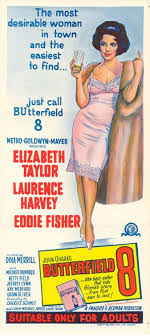by Lisa Lieberman
Frigid women. Manipulative wives. Bad mothers. Dumb blondes.  Alcoholism. Failing marriages. Furtive sex. Before Mad Men revived these retro conventions and somehow made them hip, they were just tawdry. The poster for BUtterfield 8 (1960) shows Liz Taylor in a slip, highball in one hand, a mink coat hanging off her shoulder. “The most desirable woman in town and the easiest to find. Just call BUtterfield 8.” (In the more risqué version, she's standing by a pink telephone wearing nothing but a sheet).
Alcoholism. Failing marriages. Furtive sex. Before Mad Men revived these retro conventions and somehow made them hip, they were just tawdry. The poster for BUtterfield 8 (1960) shows Liz Taylor in a slip, highball in one hand, a mink coat hanging off her shoulder. “The most desirable woman in town and the easiest to find. Just call BUtterfield 8.” (In the more risqué version, she's standing by a pink telephone wearing nothing but a sheet).
In real life, Liz had just wrecked Eddie Fisher's marriage. He plays her friend Steve in this picture, long-suffering an older-brotherly way, a real prince. He left Debbie Reynolds for Liz, but she's the one doing penance here. Liz's character, Gloria, is angry, manipulative, and a nymphomaniac: the dark side of 1950s womanhood, as perceived by 1950s men. Nobody would ever mistake her for a nice girl.
The married guy she's cheating with, Liggett, is married to a nice girl, Emily. She's long-suffering too. She knows her husband is lying to her, he drinks too much and beats her around, but she blames herself for tempting him with a job in Daddy's company when she should have let him stand on his own two feet. Actually, it's not all Emily's fault. Emily's mother played a part in emasculating Liggett. They blamed mothers for everything in the 1950s and, let me tell you, Gloria's mother's got a lot to answer for too.
Poor Gloria. Behind her back, the men who buy her drinks and expensive trinkets (less crass than paying money for her “services”) make jokes about how they ought to rent out Yankee Stadium, the only place big enough to hold all her ex-conquests. Poor Liz. She may have won the Oscar for her role, but it wasn't worth the humiliation.
It wasn't only Liz, though. “Prepare to be shocked,” promised the trailer to A Summer Place, “because this bold, outspoken drama is the kind of motion picture excitement demanded by audiences today.” Really? I can't imagine what audiences in 1959 found shocking about this picture. As an exposé of sexual hypocrisy, it's pretty tame. Yes, there's an extramarital affair, but the betrayed spouses are so unsympathetic you're cheering the adulterous couple on. There's a pair of teenaged lovers having sex too, but Molly (Sandra Dee) and Johnny (Troy Donahue) are driven into one another's arms by the screwed-up adults in their lives. Knowing the mess that both Dee and Donahue made of their own lives, it's tempting to read more into this picture. When Johnny's alcoholic father calls Molly “a succulent little wench,” we're obviously meant to feel, with Johnny, that this accusation is unjust, but he only disputes the “wench” part. Dee is indeed succulent, her surface innocence barely concealing her sexual readiness. Toward the end of her life, the actress revealed that she had been raped repeatedly by her step-father as a child. The way she was presented in A Summer Place, it's all there. Poor Sandra.
Read more »
 When I was a child back in the nuclear-anxiety-Cold-War 1950s I went to see a film called Godzilla, King of the Monsters. I probably noticed that the people on screen didn’t look like Americans. They looked – well, I don’t know what I would have called them then, but they were in fact Japanese, except for this reporter guy (Raymond Burr) who talked a lot. What I remember is being scared out of my wits by this HUGE monster that seemed determined to destroy the world.
When I was a child back in the nuclear-anxiety-Cold-War 1950s I went to see a film called Godzilla, King of the Monsters. I probably noticed that the people on screen didn’t look like Americans. They looked – well, I don’t know what I would have called them then, but they were in fact Japanese, except for this reporter guy (Raymond Burr) who talked a lot. What I remember is being scared out of my wits by this HUGE monster that seemed determined to destroy the world.